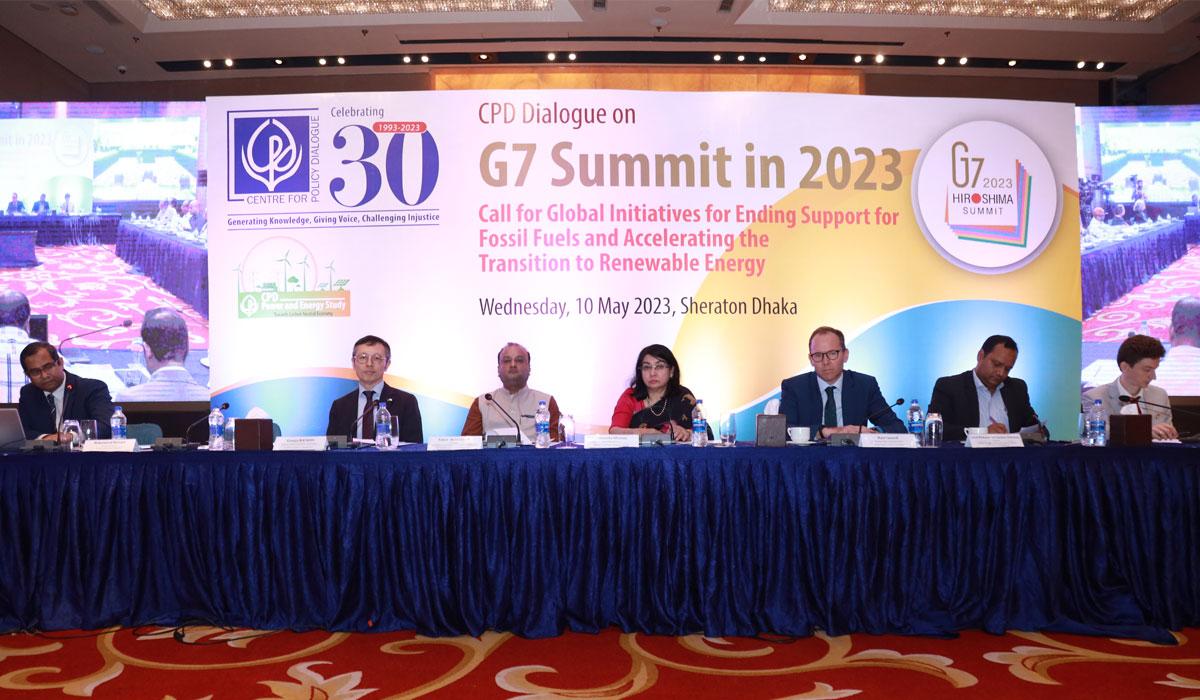
The 49th G7 Summit is scheduled to be held on 19-21 May 2023 at Hiroshima, Japan. The Summit will underscore the regional and global crises as well as emergent issues such as the climate crisis. Global leaders will discuss phasing out fossil fuels by 2030 to mitigate climate change and ensure energy security. Bangladesh, as a developing country, is particularly interested in initiatives by developed countries to transition to renewable energy and end fossil fuel use.
In the above context, the dialogue titled “G7 Summit in 2023: Call for Global Initiatives for Ending Support for Fossil Fuels and Accelerating the Transition to Renewable Energy” was organised by the Centre for Policy Dialogue (CPD) on 10 May 2023, at Sheraton Dhaka.
Dr Fahmida Khatun, Executive Director, CPD, chaired the session and said “The G7 Summit has several targets such as reducing Green House Gas (GHG) emissions, phasing out fossil fuels, and transitioning to renewable energy. However, concrete actions to support these goals have not been specified. Developing countries have the opportunity to highlight their specific demands during the events like the G7 Summit.”
In his keynote presentation, Dr Khondaker Golam Moazzem, Research Director, CPD, emphasised on the need to address energy security and clean energy concerns in G7 countries, specifically regarding investments in fossil fuels in Bangladesh and the demand for renewable energy financing. He noted that G7 commitments are currently stagnant, with some countries moving in opposite directions. The ongoing debates and discussions on fossil fuel and renewable energy financing in the G7 are ambiguous, delayed, and unstable.
Bangladesh expects guidance, assistance, support, and funding from G7 to prevent, mitigate, and adapt to climate change. The G7 should stop investing in fossil fuels, including coal and Liquefied Natural Gas (LNG), in developing nations. Investment in LNG should be prevented since it is a carbon-based fuel.
The G7 should set renewable energy finance targets and focus on funding the sector in developing countries. Advanced renewable technology should be encouraged, and low-cost renewable technologies should be transferred to developing nations. They should not be excluded from a global carbon market, managed by third parties. The transition to a net-zero future must be just and inclusive, with gradual structural reforms to avoid harming developing nations’ economies. Green purchasing and circular economy transition should consider the global supply chain and avoid erecting non-trade barriers.
Dr Moazzem urged the G7 to immediately end coal investment in developing countries, meet their 2022 commitment by 2023, and stop supporting LNG import and financing LNG infrastructure in those countries. The summit should focus on promoting and financing renewable energy in developing countries and allowing them to use advanced technologies. However, the use of untested, debatable, and expensive technologies like hydrogen fuel and ammonia should not be imposed on developing countries. A global carbon market should include developing countries and be managed by third-party organisations for a just and inclusive transition to a net-zero future.
Mr Tanvir Shakil Joy, MP, Member, Parliamentary Standing Committee on Ministry of Environment, Forest and Climate Change said, “There are several plans on how we can transition to renewable energy sources, but these plans need to be implemented and coordinated in an appropriate way so that the livelihoods of the common people do not get hampered.”
“Bangladesh needs to plan the immediate, short-,medium- and long-term plans with realistic steps so that the 2040 goals can be achieved” said Mr Tatsuya Machida, Deputy Chief of Mission (Minister), Embassy of Japan. He also claimed IEPMP to be an ambitious and realistic plan in terms of reaching clean energy targets and current technological resources respectively.
Commenting on how Bangladesh can transition to renewable energy, Mr Florian Höllen, Head of Cooperation, Embassy of the Federal Republic of Germany, said “There is a potential for geothermal power in Bangladesh using old existing drillings for gas and turning them into sources of heat and also from the heat of the inner Earth.” He also highlighted that there is a potential for harnessing wind power by using onshore and offshore wind which has not been tapped yet. Additionally, he emphasised on the investment in private sector and welcomed suggestions for specific technologies for which patent fee could be exempted for Bangladesh.
Mr Matt Cannell, Acting High Commissioner, British High Commission said, “Developing countries like Bangladesh should try to leverage more finance out of the International Financial Institutions (IFIs) system for energy security”. He also mentioned about scaling up Green Climate Fund, IMF Resilience and Sustainability Trust and Climate Finance Taskforce formed during COP 26 and how through these, Bangladesh can be benefitted from the UK.
Mr Syed Mohammad Aminur Rahman, Director, Energy Efficiency & Conservation, SREDA, Government of Bangladesh offered comments and said that the issues of renewable energy technologies transfer, funding for climate crisis and energy efficient technologies could be raised in the upcoming G7 Summit.
High-level policymakers, diplomats, foreign delegates, researchers, development practitioners, academics, business leaders, civil society representatives, international development partners, and journalists participated in the dialogue.


